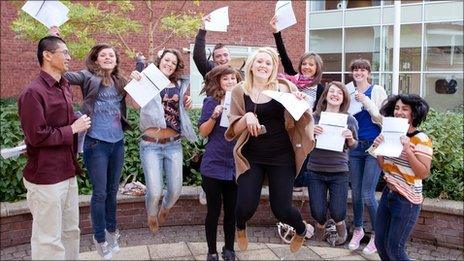Wales A-level results: Fall in number gaining A and A*s
- Published

Students at Yale College in Wrexham celebrate their A-level results
The percentage of students gaining top grades in A-levels in Wales has fallen, with girls widening the gap over boys.
Students achieving A*s fell slightly from 6.5% to 6.3% while the proportion of students gaining A grades fell from 24.4% last year to 23.9%.
The results come amid fears that the scramble for university places in Wales will be more competitive than ever with a new cap on places.
Applications to Welsh universities are higher than in the rest of the UK.
Overall, there was a slight increase in the percentage of students in Wales who gained A* to E grades, from 97.1% in 2010 to 97.2% in 2011.
Girls continued to outperform boys with 97.7% of subject entries by girls gaining A* to E grades, compared to 96.6% of entries by boys.
The percentage of girls gaining A grades improved to 24.8% but the percentage of boys gaining top marks fell from 24.3% in 2010 to 22.7% this year.
But the number of boys sitting A-levels in Wales was up 3.3%.
It means the percentage of entries gaining A grades is now at its lowest level in Wales since 2006.
A teachers' union said more students than ever had passed and their exams.
Dr Philip Dixon, director of ATL Cymru, said: "In time we will need to make a measured and sober assessment as to why the numbers gaining top grades has fallen slightly.
"However, today must be a day of celebration and not autopsy."
Gareth Pierce, chief executive of the WJEC, said one possible explanation for the drop in top grades was the increase in the number of boys taking A-level exams.
"The boys performance is not as strong as girls so I think there is a connection there," he said.
"The question for Wales is whether we are giving enough support for boys attainment post 16.
"There are plenty of initiatives lower down in schools but I think its an important message for Wales to continue that support well beyond aged 16 as well."
The BBC's Colette Hume joined some students as they found out how they had done
The number of students sitting the Welsh Baccalaureate rose significantly, with 6,948 candidates awarded the A grade equivalent, compared with 4,360 in 2010.
As students opened their results those who did not make the grade faced a fight for a university place.
Applications are up dramatically in all but two of Wales' 10 universities, but the number of places is likely to remain roughly the same as last year.
A new Welsh Government cap means universities face fines if they recruit above their quotas.
Those who miss out may still land a place through the clearing system with all universities except Aberystwyth expected to have some spare places.
Apply again
There will be competition, though, from English, Scottish and Northern Irish applicants aiming to avoid increases in tuition fees due to be introduced next year.
Greg Walker, deputy director of Higher Education Wales, told BBC Radio Wales: "Almost all universities in Wales will have some clearing places available today.
"Some will actually have more clearing places than last year - there are some where that's not the case.
"There will be some disappointed students - those students with good grades that have not managed their [university selection] will have an opportunity to apply again and I would encourage them to think about that."
Eleri Jones, head teacher of Ysgol Brynhyfryd in Ruthin in Denbighshire, said: "There's such competition for places for medicine and veterinary surgery but we also find courses such as physiotherapy very, very competitive.
"Because the applications are made prior to the results then sometimes students are not offered places, but when their results come and they reapply they are able to secure a place for the following year."
Despite achieving four A*s and the Welsh Baccalaureate, pupil Susie Gregory does not have a place at university.
She said: "I want to do veterinary medicine. There's not many places for that so I'm going to take a year out and apply next year."
- Published18 August 2011
- Published19 August 2011
- Published19 August 2010
- Published20 August 2010